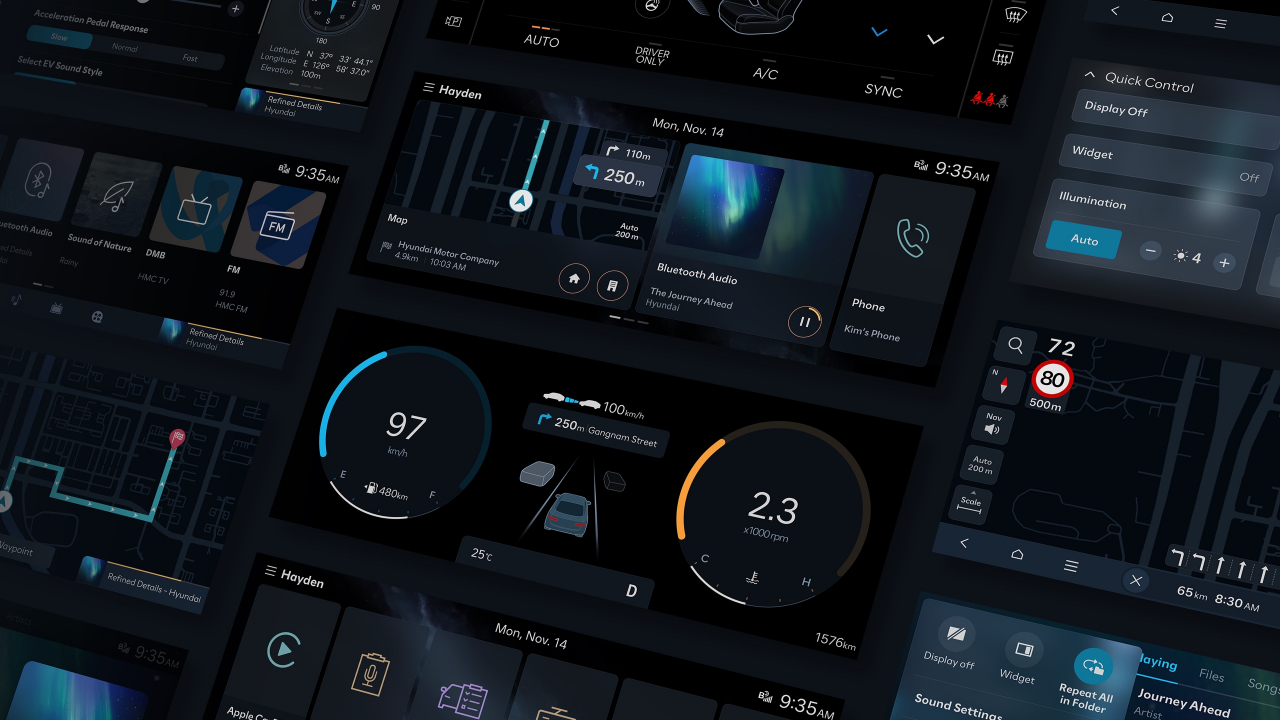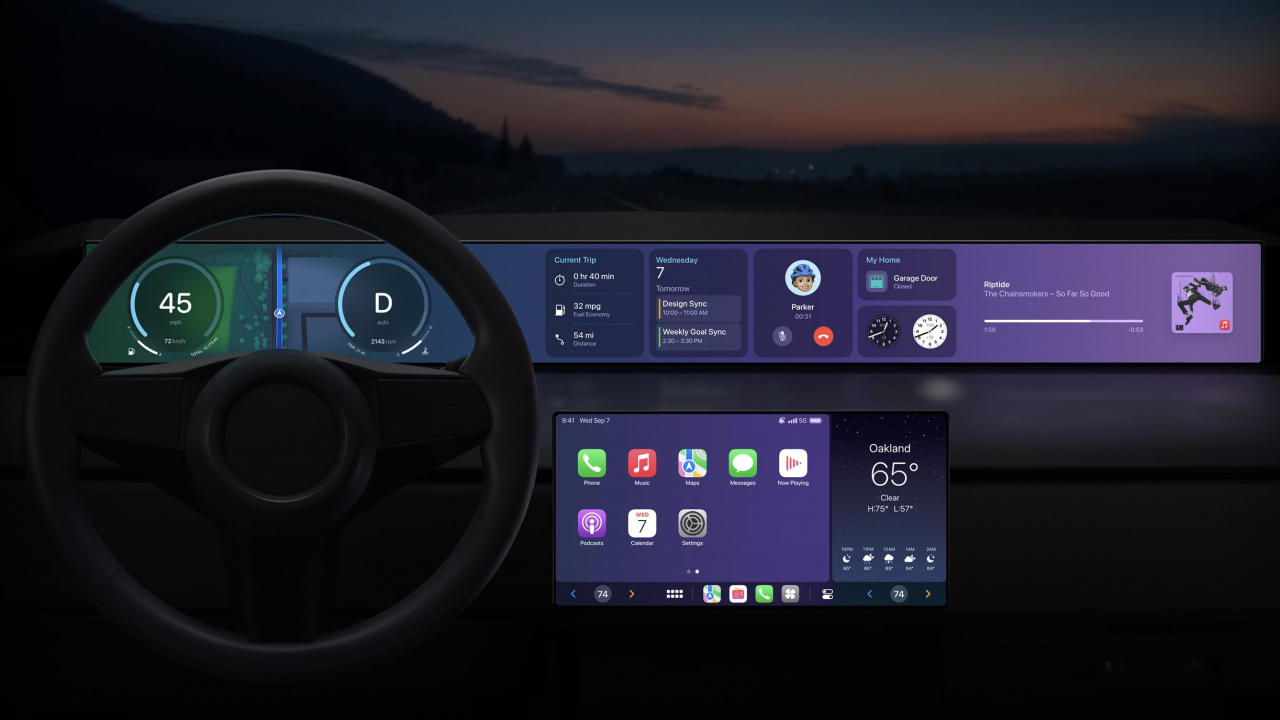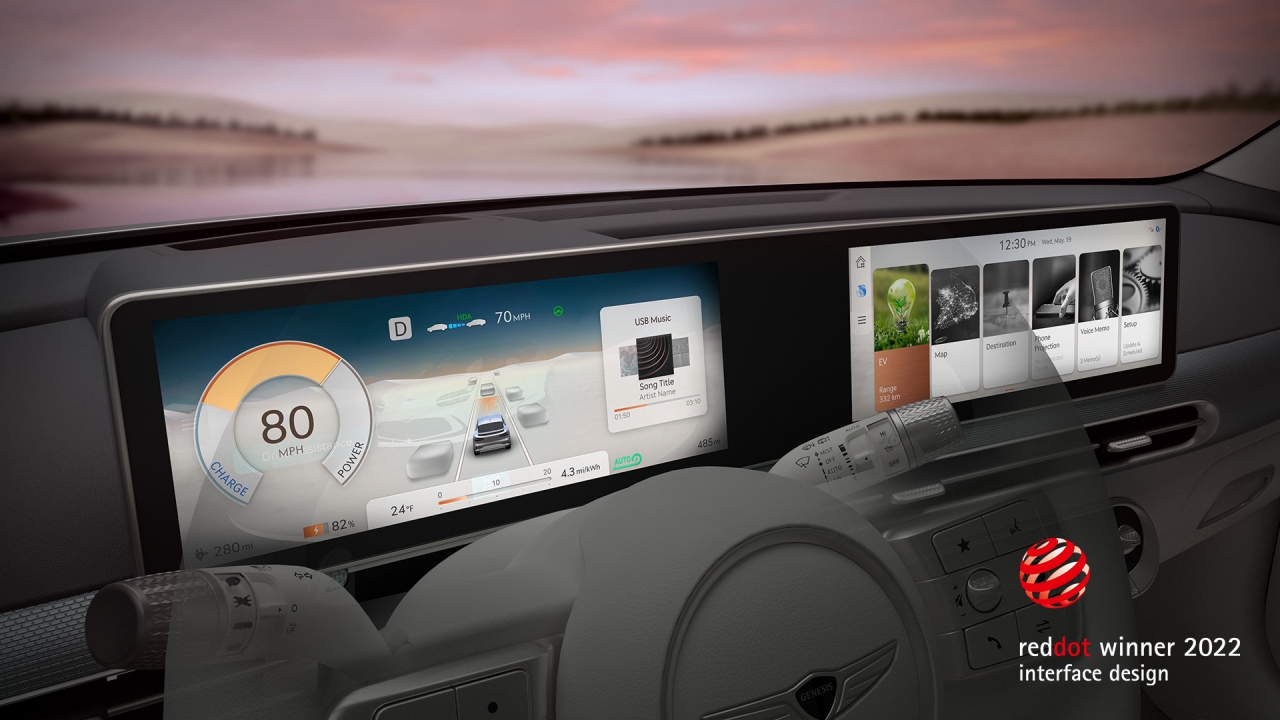[KH Explains] Why Hyundai Motor has no plan to adopt Apple’s upcoming CarPlay
Amid hegemony war in future mobility, carmaker focuses on advancing own operating system to secure more control over massive data
By Moon Joon-hyunPublished : Dec. 18, 2023 - 15:38

Hyundai Motor Group could compete head-to-head with Apple in software, a domain where Apple, as the world's most valuable company, is known to excel, as the South Korean automaker is progressing toward its own software-defined vehicle vision that aims to incorporate its proprietary connected car operating system into all new models by 2025.
This bold move could be part of its strategy to dominate in-car screens with its own software, potentially opening new revenue streams through content and user data collection needed to pave the way for future autonomous vehicles.
Hyundai’s competitor is Apple’s CarPlay software, first unveiled in 2013, which integrates iPhone features into car displays, allowing access to navigation, music and more. Hyundai was one of the earliest adopters, releasing its first models with CarPlay support in 2015. At its 2022 Worldwide Developers’ Conference, Apple claimed that 79 percent of US car buyers prioritize CarPlay when choosing a vehicle.

However, Hyundai was conspicuously absent from the list of carmakers that pledged support for what Apple dubbed as the "next generation of CarPlay," unveiled during the conference. The all-new CarPlay experience offers deeper vehicle integration with vehicle telematics like gauges and the engine and supports multiple displays, including the central screen, instrument cluster, and passenger-side screens in advanced vehicles. It also introduces customization options like personal wallpapers and car-optimized widgets from iPhone apps.
"We are committed to developing proprietary software, focusing on enhancing vehicle performance and enriching the driving experience through our custom-built operating system," a spokesperson from Hyundai commented on the lack of support.
Hyundai has emphasized that while it is not supporting the newly announced multi-screen, next-gen CarPlay, it will maintain compatibility with the existing version of CarPlay. This includes the traditional single-screen setup and features like wireless connectivity, ensuring that its customers will continue to have access to this functionality across all Hyundai, Kia and Genesis models that currently support it.
Fourteen automakers, including Land Rover, Mercedes-Benz, Lincoln, Audi, Volvo, Honda, Porsche, Nissan, Ford, Jaguar, Acura, Polestar, Infiniti and Renault, are set to support the next-gen CarPlay, with specific model announcements scheduled by late 2023, according to Apple.
As of Dec. 21, Aston Martin and Porsche have previewed the first vehicle dashboards with support for Apple's next-generation CarPlay experience. But the specific models that support it are still unknown.
When it comes to driver satisfaction, Hyundai has fared better than Apple and other automotive rivals. Its Genesis brand achieved a 74 percent satisfaction rating in a 2022 Consumer Reports Survey, surpassing Apple CarPlay's approximately 60 percent and leading the pack among 33 car brands.

Hyundai offers two advanced vehicle operating systems that power these infotainment features: the Connected Car Integrated Cockpit for its premium Genesis models and the Connected Car Navigation Cockpit for other models. The CCIC, exemplified in the Genesis G90, merges dual 12.3-inch displays into a comprehensive interface, integrating driving, media, and navigation data. The CCNC, introduced first in the all-new Grandeur 2023, offers two separate displays with similar, but less flexible functionality.
"Automakers have the final say on adopting the next-gen CarPlay, and it's not dependent on vehicle specifications. Even cars without the latest integrated displays, like those merging the cluster and center screen, can support it," said an engineer from the Korean auto parts maker Hyundai Mobis who wished not to be named.
Although Hyundai, as a native developer, will always integrate a more comprehensive vehicle operating system within its cars, including telematics, infotainment, and vehicle control, Apple's next-gen CarPlay is starting to blur these boundaries. The multi-screen CarPlay with deeper vehicle integration is evolving beyond a mere iPhone-powered interface, encroaching into areas traditionally managed by vehicle-specific operating systems.
"Hyundai might believe it can hold its own against a tech giant like Apple with its car software. They might reckon it's good enough not to deter buyers while giving them the control and data they want. You know, supporting next-gen CarPlay won't necessarily double their sales," said Koo Sang, a professor at Hongik University and an expert in automotive and mobility design who had worked at Kia Motors Design Institute.
“Plus, there's always the question of what Apple might do with all that vehicle telematics data from CarPlay," he added.
In an abrupt strategic pivot, General Motors announced in April that it would eliminate Apple CarPlay and Android Auto across its EV lineup, transitioning to Google-backed infotainment systems in future models. This move is seen as central to GM's aggressive push toward its proprietary Ultifi software platform, a shift aimed at enhancing data collection and bolstering subscription-based revenue streams. GM wants to dramatically expand its subscription revenue, targeting an increase to $25 billion by 2030.
Hyundai Motor, on a parallel track, is committing 12 trillion won ($9.2 billion) on software development, a whopping 60 percent of its entire electrification investment by 2030, to boost software sales to 30 percent of its total revenue.
The company's swift adoption of SDV strategy, following a trend set by Tesla in 2014, has been enabled by partnerships with entities like Hyundai Mobis, mobility software provider Hyundai Autoever, and in-vehicle and cloud software developer Sonatus.
However, the advent of Apple's next-generation CarPlay presents Hyundai with the dilemma between realizing its SDV vision for self-driving data collection and in-car infotainment revenue streams and addressing market demands to incorporate popular systems like CarPlay that might sway consumer decisions.
"Whether Hyundai's software, boasting improved driving functions, sleek interfaces, and clever features, can go toe-to-toe with Apple's advanced CarPlay is still up in the air. However, they seem to have the upper hand right now, given the highest-rated top-notch infotainment system, broad partnerships and significant investment in SDV," Koo said.







![[Weekender] How DDP emerged as an icon of Seoul](http://res.heraldm.com/phpwas/restmb_idxmake.php?idx=644&simg=/content/image/2024/04/25/20240425050915_0.jpg&u=)



![[KH Explains] No more 'Michael' at Kakao Games](http://res.heraldm.com/phpwas/restmb_idxmake.php?idx=644&simg=/content/image/2024/04/28/20240428050183_0.jpg&u=20240428180321)







![[Herald Interview] Mistakes turn into blessings in street performance, director says](http://res.heraldm.com/phpwas/restmb_idxmake.php?idx=652&simg=/content/image/2024/04/28/20240428050150_0.jpg&u=20240428174656)
